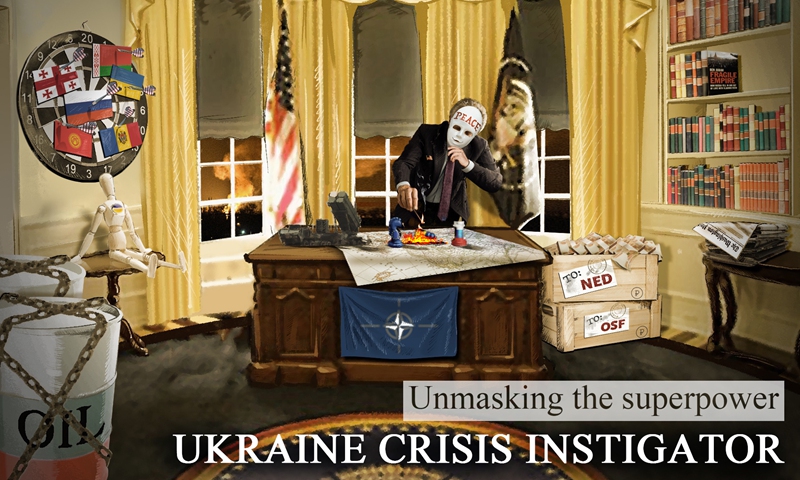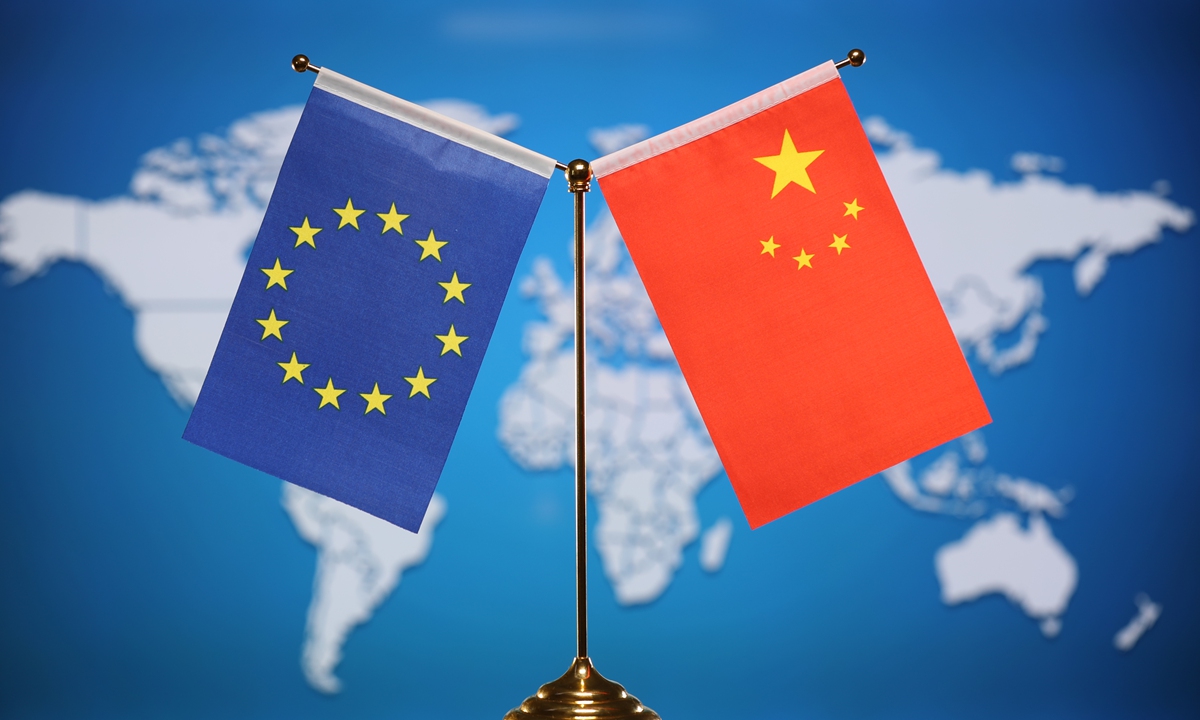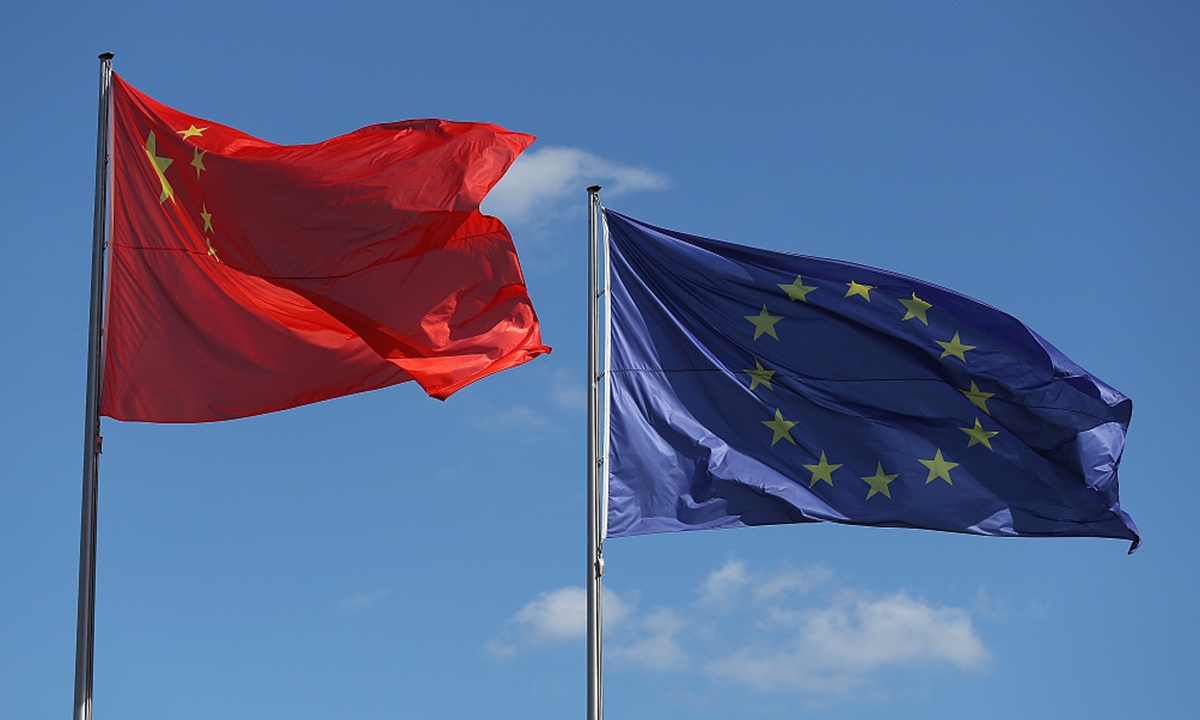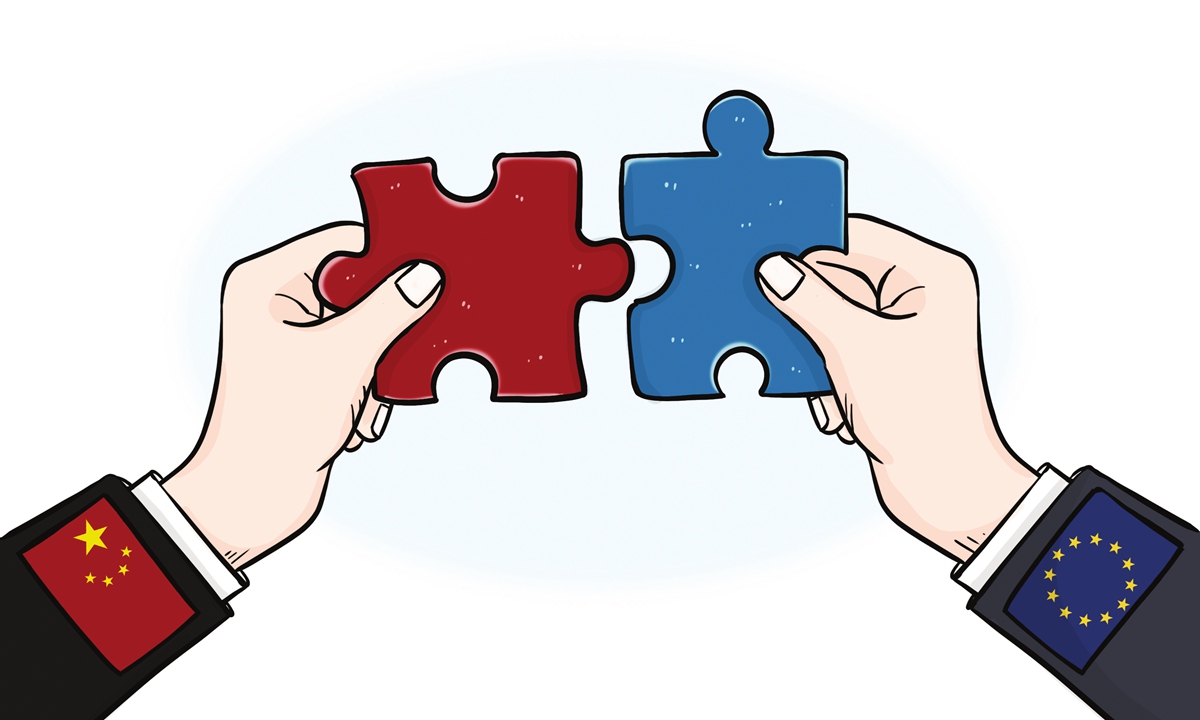Editor's Note:
Since the military conflict between Russia and Ukraine began, the international community has grown increasingly aware of the roles the US and NATO have played behind the crisis.
From launching color revolutions around the world to leading NATO's eastward expansion to hem in Russia's territorial space; from imposing sanctions on "disobedient countries" to coercing other nations to pick sides… the US has acted like a "Cold War schemer," or a "vampire" who creates "enemies" and makes fortunes from pyres of war. The Global Times is publishing a series of stories and cartoons to unveil how the US, in its superpower status, has been creating trouble in the world one crisis after another.
This is the fourth installment.
 Supporters of Pro-Russian groups protest during US Secretary of Defense Lloyd Austin' visit in Bulgaria on March 19, 2022 in Sofia, Bulgaria. Photo: AFP -Anti-government protestors wait at the entrance of a barricade in front of the Dynamo Kiev stadium in Ukraine on February 23, 2014. Photo: AFP
Supporters of Pro-Russian groups protest during US Secretary of Defense Lloyd Austin' visit in Bulgaria on March 19, 2022 in Sofia, Bulgaria. Photo: AFP -Anti-government protestors wait at the entrance of a barricade in front of the Dynamo Kiev stadium in Ukraine on February 23, 2014. Photo: AFP
On the evening of December 25, 1991, the hammer and sickle flag representing the Union of Soviet Socialist Republics was slowly lowered over the Kremlin, and the flag of the Russian Federation in white, blue, and red was raised on the same flagpole.
The change of flags signified the official disintegration of the Soviet Union, which had existed for 74 years, as well as the end of the 44-year Cold War.
There were no ceremonies held in Moscow that night, just the dull tolls of bells from Spasskaya Tower from across the Kremlin. Meanwhile, on the other side of the Pacific, Americans proclaimed internationally how they had defeated the Soviet Union and won the Cold War victory.
It has been 31 years since this period in history, and several major changes have taken place in the world order and international patterns. However, these have not dispelled the arrogance of the US enraptured in the title "winner of the Cold War" and its overconfidence in the "maker of history" conclusion.
Standing at the start of the third decade of the 21st century, people can witness how American politicians still view every country considered to be a threat through the Cold War lens. They are still keen to incite ideological hostility and battle their own imaginary enemies, which makes the dissipation of the dark Cold War clouds virtually impossible. The shadow of the Cold War has spread from Washington to Beijing and Moscow.
From disintegrating the Soviet Union to designing the "Ukrainian Trap" step by step with the intention of achieving the strategic goals of "eliminating" Russia, suppressing Europe, containing China and maintaining an absolute hegemony, the "strategic master plan" adopted by the US can kill many birds with one stone in order to dominate the world.
The US is still a schemer that harbors a Cold War mentality.
US plays 'central role' in political demise of Soviet Union
"NATO is a defensive alliance that has never sought the demise of Russia," said US President Joe Biden, defending the eastward expansion of NATO in a speech he delivered in Warsaw on March 26, but turning a blind eye to the "not one inch eastward" pledge that NATO had made in the 1990s. Biden's words were not a complete lie, as there's little possibility of trying to eliminate (or, achieve the demise) of a nuclear world power with more than 17 million square kilometers of land and a permanent seat on the United Nations (UN) Security Council.
A physical "demise" of Russia is almost impossible. Nonetheless, the US-led NATO has been attempting to "eliminate" Russia in the past decades in various aspects including politically, economically, culturally, and ideologically, in order to keep dividing and weakening Russia, observers noted. Having acted out a similar script on the Soviet Union, the US is now looking forward to an encore performance on present-day Russia.
"The American role in the political defeat of the Soviet Union... was indeed central," Zbigniew Brzezinski, a renowned US geopolitical expert who served as President Jimmy Carter's National Security Advisor from 1977 to 1981, pointed out in his book Second Chance: Three Presidents and the Crisis of American Superpower. "The defeat of the Soviet Union was the consequence of a forty-year bipartisan effort that spanned the presidencies," he wrote. "...almost every US President made a substantial contribution to the outcome."
A prominent example of this "effort" was the US' Strategic Defense Initiative, also known as the "Star Wars program," which was proposed by then US President Ronald Reagan in March 1983. The US proposed the program to try to maintain its nuclear superiority, hoping to bring the Soviet Union's economy to its knees through space arms races.
The US announced the end of the program after the collapse of the Soviet Union in 1991. The release of the secret Central Intelligence Agency (CIA) documents in the Cold War era showed that the "Star Wars program" that the US had hyped was no more than a calculated strategic deception.
Another "Cold War tool" resorted by the US was its foreign propaganda machine system, such as the Voice of America (VOA). Founded in 1942, VOA began to serve the US' Cold War strategy after WWII, and became the main tool for the US government's promotion to the Soviet people of, not only the American way of life but also the principles of the "free world."
In the 21st century, the US still wields its ideological "soft knife," playing up its color revolution intrigues under the disguise of "democratic values" to countries such as Ukraine, Georgia and Tunisia, which only brought about three instances of political turmoil, mass impoverishment and war.
US engrossed in creating purported enemies
The end of the Cold War between the US and the Soviet Union did not bring about an end to the US' Cold War mindset, which continues to haunt the White House, Capitol Hill, the Pentagon and the CIA even today. American politicians view the international situation through a "zero-sum game" and "ideological competition" mindset, and keep seeking out purported enemies - now Russia and China.
It is truly a reflection of the US' geopolitical strategic ambition when former US President Barack Obama said that "Russia is a regional power that is threatening some of its immediate neighbors" or when the incumbent, Biden, said Russia is the country that most "threatens [the] security" of the US while China is US' main competitor. There has long been an anti-Russian consensus among America's political elites.
After the collapse of the Soviet Union, Russia had pinned great hopes for the West. But as former US Secretary of State Mike Pompeo said, "We lied, we cheated, we stole… we had entire training courses" and "It reminds you of the glory of the American experiment." That encompasses reasons why an ambitious schemer cannot be trusted.
https://youtu.be/DPt-zXn05ac
From 1999 to 2020, NATO increased its membership from 16 to 30 through an eastward expansion, completing the 3,000-kilometer-long strategic encirclement of Russia.
Since 2014, Russia has been slapped with 5,532 sanctions, according to sanctions monitoring database Castellum.ai, followed by Iran, Syria and North Korea. And Moscow has been subjected to 2,778 new sanctions in less than two weeks since Russian President Vladimir Putin ordered troops' advancement into Ukraine.
At the same time, the US has been trying to undermine Putin's domestic authority, paving the way for a potential "color revolution" in Russia.
Who set the 'Ukraine trap'
Analysts point out that the current situation in Ukraine is a trap that the US has spent years digging into and is determined to draw Russia into.
To prevent Russia from becoming a threat to US hegemony again, the US has promoted two "color revolutions" in Ukraine, first by putting the pro-West Viktor Yushchenko in the presidency in 2005 and then forcing pro-Russian president Viktor Yanukovych out of office in 2014.
Since August 2021, the US government has been speculating about Russian troops along the border with Ukraine and the possibility of an "imminent invasion" of Ukraine, which further provoked Russia.
It is almost certain that not only does the US want to deter Russia, but it also wants Russia to send troops to Ukraine, said Tang Shiping, a professor at the School of International Relations and Public Affairs at Fudan University, adding that the real purpose of the US' actions was to force Russia to use force against Ukraine.

Supporters of US-backed Ukrainian opposition leader wave flags during a rally in Kiev, Ukraine on November 28, 2004. Photo: AFP
The tactic of weakening Europe's strategic autonomy by putting it in a dangerous situation, a tactic that the US always used during the Cold War, is being played out again in the Russia-Ukraine conflict. In this gradual escalation of the situation in Ukraine, the US continues to provide funds and weapons to Ukraine and impose a full range of sanctions on Russia. The sense of crisis created by the US has also strengthened Europe's dependence on the US and NATO, thus greatly enhancing the US' chokehold over Europe, experts noted.
Complex security issues should not be dealt with in a simplistic approach of determining whether "friend or foe" or "black or white," said Chinese State Councilor and Foreign Minister Wang Yi during a virtual meeting with the High Representative of the European Union for Foreign Affairs and Security Policy Josep Borrell Fontelles on March 29, 2022. "Facts have proven that the outdated Cold War mentality and camp confrontation leads nowhere in Europe, let alone the acts of taking sides and dividing the world," Wang noted.
Dragging the Cold War to the 21st century
"After 1991, the Cold War did not really end, as the US and NATO have not stopped strategically hemming Russia's territorial integrity. In recent years, the US has also regarded China as its main competitor, trying to shape an external environment that is not conducive to China's development through various means," Lü Xiang, a research fellow on US studies at the Chinese Academy of Social Sciences in Beijing, told the Global Times.
American politicians not only harbor a "Cold War mentality," but also continue to promote a new "Cold War strategy."
Robert Gates, former secretary of defense, wrote in the Washington Post on March 3 that "A new American strategy must recognize that we face a global struggle of [an] indeterminate duration against two great powers that share authoritarianism at home and hostility to the United States."
The two countries Gates refers to are undoubtedly Russia and China. Containing them and ensuring that no one can shake US' hegemony has become the core of the US' current global strategy.
"NATO members have demonstrated their loyalty to Washington by vowing to follow its orders aimed at ultimately containing Russia," the Russian Foreign Ministry's spokesperson Maria Zakharova said on March 24, adding that Washington once again "disciplined" its allies by pressuring sovereign countries and erasing Europe's strategic autonomy.

Supporters of Pro-Russian groups protest during US Secretary of Defense Lloyd Austin' visit in Bulgaria on March 19, 2022 in Sofia, Bulgaria. Photo: AFP
In terms of China, the US government has introduced the "Pivot to Asia" and the "Indo-Pacific strategy," and has united with Japan, India, Australia, and other countries in the region to consolidate small strategic cliques such as "QUAD" and "AUKUS," trying to contain China from multiple directions.
Wu Xinbo, dean of the Institute of International Studies at Fudan University, summed up that the competition between the US and China will be all-rounded, involving governments and societies; in-depth competition could lead to a serious weakening or even decoupling of China-US ties in the fields of industrial chain, science and technology, and people-to-people and cultural exchanges; in terms of intensity, competition is extraordinary.
"Since President Joe Biden entered the White House a year ago, he and his top advisers have insisted they are not looking for a return to the superpower competition between the United States and the Soviet Union that dominated global affairs for nearly five decades. Yet one year into his presidency, Biden's actions have indicated otherwise," a commentary published on the US National Interest website stated, adding that in all areas of US foreign policy, the Biden administration has a Cold War-style mentality.
"The Cold War was not a golden era of foreign relations, but instead was a tragedy that cost millions of lives around the world. Washington cannot fall for feel-good nostalgia about its Cold War victory," it stated
Related posts:
That sinking feeling from Down Under: Australia, United Kingdom and United States (Aukus) pact
AUKUS plans to provide nuclear submarines to Australia seriously endangers nuclear non-proliferation
AUKUS plans to provide nuclear submarines to Australia seriously endangers nuclear non-proliferation
Beyond the submarine feud, contains China's rise
'We lied, we cheated, we stole', ‘the Glory of American experiment’ by US Secretary of State/Ex-CIA director Mike Pompeo
SAVING FUE AS PRICES AT PUMPS SOAR











































